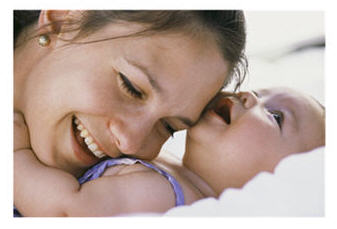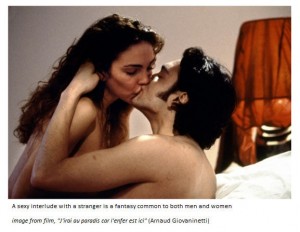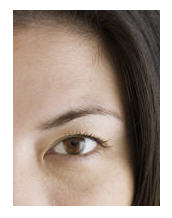Oh, those first days and weeks of falling in love! Perhaps it’s with your infant, as you hold her in your arms and breathe that miraculous scent of new life.
 Maybe it’s a man who sweeps you off your feet and the air is sweeter, colors more vibrant, and you find a bounce in your step that you thought was gone forever.
Maybe it’s a man who sweeps you off your feet and the air is sweeter, colors more vibrant, and you find a bounce in your step that you thought was gone forever.
When we love, blind spots are inevitable.
When we love romantically, sometimes they run their course, we settle into a more realistic appreciation of our partner, and we see the relationship for what it is – good, albeit imperfect, or not so good – and time to face that particular music.
And when it comes to our children?
Ah, those blind spots are broad and deep.
Then again, some might say that parenting itself is an exercise in groping blindly as we go – certainly with a first child, perhaps with the first of each sex, perhaps with each child at each and every new stage – as they respond differently and need differently. Naturally, time plays its role; we evolve as parents, as do circumstances and their impact on our perception and our actions.
Parenting, Blindly
There were times when my sons were younger and others made remarks about their behaviors, their development, their personalities – and I might nod and acknowledge the comments, and then dismiss them as absolute nonsense. After all, as a parent, I certainly knew my own children better than the teacher or the neighbor or the nosy stranger – usually.
Advice on parenting from others?
Some we take, some we ponder, and any that attacks our children – we tend to toss away like yesterday’s garbage.
Love for a child is primal, visceral, powerful beyond anything we imagine until we become mothers and fathers and understand the bond so fierce as to be inexplicable. For most of us, we will protect our children to the death. Period.
Does that mean we don’t absorb the messages we just don’t care to hear? Or must we take our time to process, and arrive at our own answers?
I believe in listening to my gut, and taking time to consider the source and legitimacy of remarks about my children or my parenting. I factor in the agenda of the other person (if there is one), their experience (if they have any), and their role in my life.
I ask myself if this is someone who loves me and wants the best for me. I ask myself if this is someone who loves my children – and wants the best for them.
Sometimes, our blind spots serve our children well. At other times, they are the armor we rely on to keep going through difficult times. We are capable of taking the armor off, but we do so on our own timetable.
Loving, Blindly
As for partners? Who hasn’t had the boyfriend or husband that family has barely tolerated, that your BFF has snubbed, that something in you sensed wasn’t quite right but you wouldn’t accept it?
 What man hasn’t fallen for the vixen, the siren, the golden girl who seems to love him passionately, as his buddies tell him to tread cautiously, and he succumbs only to pay for it later?
What man hasn’t fallen for the vixen, the siren, the golden girl who seems to love him passionately, as his buddies tell him to tread cautiously, and he succumbs only to pay for it later?
Blind spots are the dazzling devils of new relationships. I’ve fallen victim in my time, and hope I’ve learned to take my time as a result.
But blind or not – that searing, sizzling, staggering set of sensations that accompanies the coup de foudre – love at first sight or early passion – is sublime. Sometimes, as the blindness fades, we find the clear light of affection and esteem and mutual pleasure in full awareness of human imperfections.
The blinders are off, and we love what we see.
Ourselves, Blindly
What about our own capacity to turn away from our failings and our frailty? Isn’t that another sort of survival – possibly helpful or, a route through denial that is potentially hazardous?
Some of us carry on by denying that we’re ill, denying that we’re acting out, denying that we need help, denying that we’re heading for a fall, denying that we are denying – the truths in how we live and love, the truths in our relationships, the truths we feel in our intuitive bodies.
 Some of us are far too hard on ourselves. We dismiss compliments, we gloss over accomplishments; we are blind to the valiant, the valuable, the viable – in ourselves. Women behave in these self-deprecating ways all too often, running scathing or demeaning dialogs in our heads scolding ourselves about the choices we make (or defer), the silences we keep (or break), the way we look, the way we look, always the way we look – and it’s never “good enough.”
Some of us are far too hard on ourselves. We dismiss compliments, we gloss over accomplishments; we are blind to the valiant, the valuable, the viable – in ourselves. Women behave in these self-deprecating ways all too often, running scathing or demeaning dialogs in our heads scolding ourselves about the choices we make (or defer), the silences we keep (or break), the way we look, the way we look, always the way we look – and it’s never “good enough.”
As for me, I like to think that if I carry on blindly – or partially so – it is only for a time, and words will penetrate – those that challenge me to face tough realities, as well as good words that remind me of my value.
- Do you know your blind spots?
- Can you find your way to other perspectives with time?
- Can you accept the blind spots in those you love?
Hmm…I’m convinced we all have our blind spots, but it would be presumptive and oxymoronic to claim to know my own. There is a negative connotation of a fault or failing to a blind spot. On the other hand, what are the myths that we live by? Do I sometimes choose these, consciously or unconsciously, to live a full life? Such scotomas might be quite helpful, so is the distinction between the two mostly one of connotation?
Thanks for your recent comments, and I believe that many of us live for love, doing the right, and stimulation of the mind. Looking forward (so to speak) to the coming ten days away and trust everything will work itself out fine for Fran and me.
Your post today made me think about blind spots I’ve had about members of my family and how – when pointed out by others – I denied, defended, or tried to explain away their shortcomings. The struggle I continue to have is knowing where the line is between being an advocate for the people you love (which is part of our job as parents) and being in denial (which most definitely isn’t). And sometimes I suspect that my instincts move me more strongly toward denial when the suggestion moves more closely to the truth.
Advice from ‘outsiders’ is sometimes a hard pill to swallow. Blinders can be a way to block out the negative we already place too often on ourselves. It never hurts to digest others words and comments, perhaps at a time when emotions have cooled some.
No-one wants to be told what we are doing wrong right in the middle of a child’s tantrum or a bicker with our significant other.
The greatest thing a human soul ever does in this world is to see something and tell what it saw in a plain way. Hundreds of people can talk for one who can think, but thousands can think for one who can see. To see clearly is poetry, prophecy and religion, all in one. — John Ruskin
A German mother here in Romania recently told me my children cried a lot. My first instinct was to tell her something negative about her child, too, and then I had to stop myself and realize I was being, well, childish. Still, it’s never easy to hear “feedback,” no matter how well-intentioned.
Stacia, I hope you keep in mind that the cultural differences are significant. I had a European mother-in-law whose opinion on child-rearing was pretty different from my own. Every time we were on your (current) side of the Atlantic, those cultural differences were pretty clear.
I used my observations to see what I liked about the way children were raised where we were (visiting), and adopted what I could. As for the rest, I stuck to my guns about what I thought was fine and appropriate based on the situation (and the age of my kids).
Not easy – finding yourself where you are – and everything you’ve had to handle.
malheureusement my “blind spots” were “on” in regards to my parents.
So much so it affected my relationships to my children…
Je suis désolée, La Bergère. We don’t always know when our blind spots are activated, and sometimes, when we realize, we’ve missed an opportunity. But I try to live by “never say never.” Occasionally, we get lucky, or wise, or both, and find our way to improved situations. J’espère que ce sera le cas pour vous.